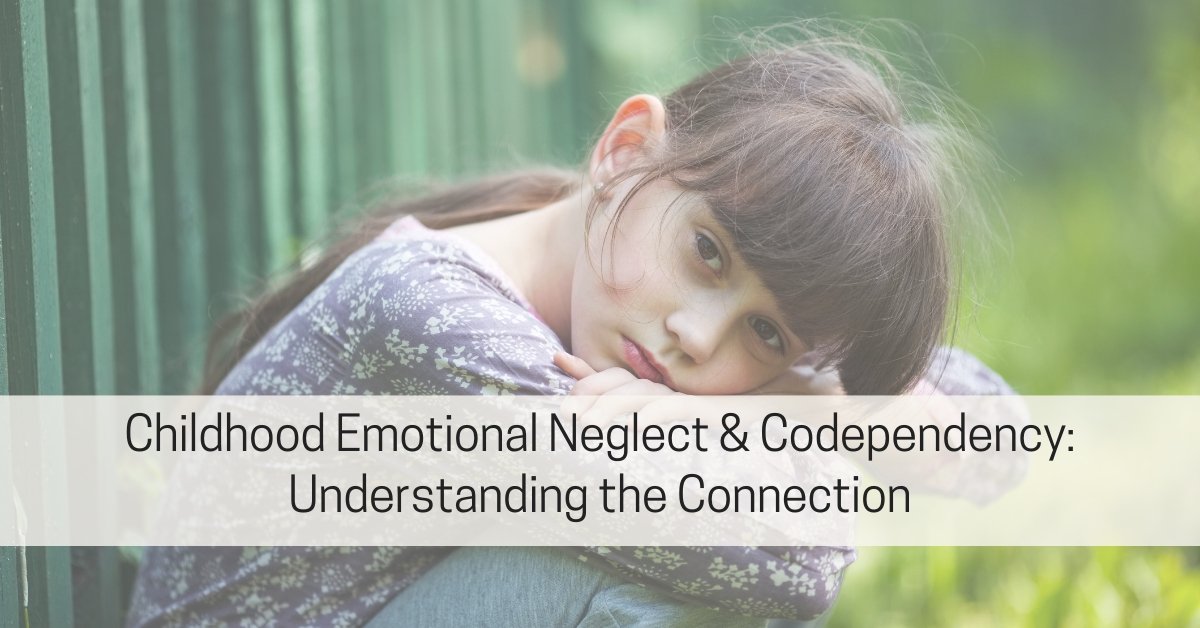Do you feel empty and disconnected? Do you sense that you’re different than everyone else, but you can’t put your finger on what’s wrong? Childhood Emotional Neglect and codependency are a powerful experience, but one that often goes unnoticed and untreated. In fact, many people who experienced Childhood Emotional Neglect (CEN) describe their childhood as “good,” and it’s only on closer examination that they recognize that something important was missing.
In this article, you’ll learn how to identify the signs of Childhood Emotional Neglect (CEN) in your own life and understand how these early experiences can shape codependent behaviors in adulthood. You’ll see how CEN influences self-worth, relationships, and the ways you relate to others.
What is Childhood Emotional Neglect?
Your childhood experiences played a big part in shaping you into the adult you are today. Children rely on their parents to meet their physical and emotional needs. And significant, but invisible, damage is done when parents fail to meet their children’s emotional needs.
Childhood Emotional Neglect, a term coined by psychologist Jonice Webb, Ph.D., refers to a parent’s inability to validate and respond adequately to their child’s emotional needs. Childhood emotional neglect can be hard to identify because it’s what didn’t happen in your childhood. It doesn’t leave any visible bruises or scars, but it’s hurtful and confusing for children.
CEN teaches children that their emotions and needs don’t matter. This lesson follows us into adulthood, leaving you disconnected from your feelings and unable to access the valuable information they contain. Left unnoticed, these unmet needs often influence how you relate to others as an adult, sometimes showing up as codependent behaviors.
How to Identify CEN
These are examples of parents not attending to their children’s emotional needs:
- A 10-year-old comes home from school visibly upset because she didn’t make the basketball team. She tries to talk to her mother about what happened, but Mom dismisses her, saying she’s busy working.
- When James’ grandma died, his father told him, “Boys don’t cry,” and no one helped him process your grief.
- A teenager spends hours isolated in his room; no one asks how he’s feeling or shows interest in him or what he’s experiencing.
Experiences like these may not seem like a big deal, but when they happen consistently, children feel unloved and unseen. All parents occasionally fail to notice and attend to their emotional needs. CEN is a pattern of failing to attend to a child’s emotional needs.
CEN can co-occur with physical abuse and neglect, and often occurs in families where a parent struggles with addiction or mental illness, or the family is frequently in crisis or experiencing chronic stress.
Many people who experienced Childhood Emotional Neglect grew up in families without obvious dysfunction. They weren’t beaten or belittled. Their parents were well-meaning but lacked the emotional skills themselves to notice and tend to their children’s feelings. Such parents never learned to cope with their feelings or express them in healthy ways, and don’t know how to deal with their children’s feelings either.
CEN can also be hard to identify because adults who experienced emotional neglect often look like they’ve got it all together. They’re successful and have happy families, but there’s a nagging sense of emptiness, not fitting in, and being different. However, there isn’t anything obviously wrong.
Symptoms of Childhood Emotional Neglect include:
- Emptiness or loneliness
- Feeling something’s fundamentally wrong with you
- Feeling unfulfilled even when you’re successful
- Difficulty connecting with most of your feelings
- Burying, avoiding, or numbing your feelings
- Feeling unimportant, inadequate, or like you don’t fit in
- Difficulty asking for help and not wanting to depend on others
- Depression and anxiety
- High levels of guilt, shame, and/or anger
- Lack of deep connection with your friends and spouse
- Difficult with self-management, such as overeating or drinking, or difficulty limiting time online
- People-pleasing and focusing on other people’s needs
- Not having a good sense of who you are, your likes and dislikes, your strengths and weaknesses
- Over-accommodating or avoiding conflict
- Seeking external validation
- Difficulty saying no or asserting boundaries
The Effects of Childhood Emotional Neglect
Your feelings are a core part of who you are, so when they aren’t noticed or validated, you come to believe that you aren’t important because you aren’t “seen” and known. In emotionally neglectful families, the message is that feelings don’t matter, they’re an inconvenience, or they’re wrong. Naturally, you learn not to value your feelings; you push your feelings away or numb them with food, alcohol, drugs, or sex.
When your emotional needs aren’t met and your internal state isn’t acknowledged, you’ll be disconnected from yourself. You will constantly seek attention and try to prove your worth through clingy or needy behaviors, perfectionism, overworking, and achievements. But these external validations never fix the problem; they never leave you feeling good enough or truly seen, which is why codependent patterns often persist.
Feelings serve to let us know what we need. For example, if you don’t notice when you’re getting frustrated, you won’t be able to find a healthy resolution or outlet for your anger and you’re likely to let it fester until you explode.
A lack of emotional attunement also makes it difficult for you to form deep connections with others and understand your partner’s and children’s feelings.
The Connection Between Childhood Emotional Neglect and Codependency
In my work with Adult Children of Alcoholics (ACOAs) and people struggling with codependency, I often see a direct connection between CEN and adult relational patterns. It makes sense that if you grew up with a dysfunctional or overwhelmed parent or caregiver, your emotional needs weren’t noticed and met.
Individuals with CEN and codependency may both struggle with:
- Perfectionism
- People-pleasing
- Low self-worth, feeling inadequate
- Fear of abandonment
- Sensitivity to criticism
- Lack of awareness of their feelings
- Discomfort with strong emotions
- Putting other people’s needs before their own
- Difficulty trusting
- Difficulty asserting their needs
Healing From Childhood Emotional Neglect and Codependency
It’s never too late to give yourself the emotional attention you missed as a child. Healing involves:
- Practicing self-awareness: notice and name your feelings daily
- Setting boundaries: expressing your preferences and saying no
- Seeking support: therapy or support groups for codependency or adult children
- Learning self-validation: affirming that your emotions and needs are valid
- Reparenting yourself: acting as a loving parent to yourself
By acknowledging the impact of CEN on your adult relationships, you can stop the cycle of codependency and build a stronger sense of self.
Learn More
This post contains an affiliate link, which means we may earn a small commission if you make a purchase through our links. There is no added cost for you.
Publisher: Source link






